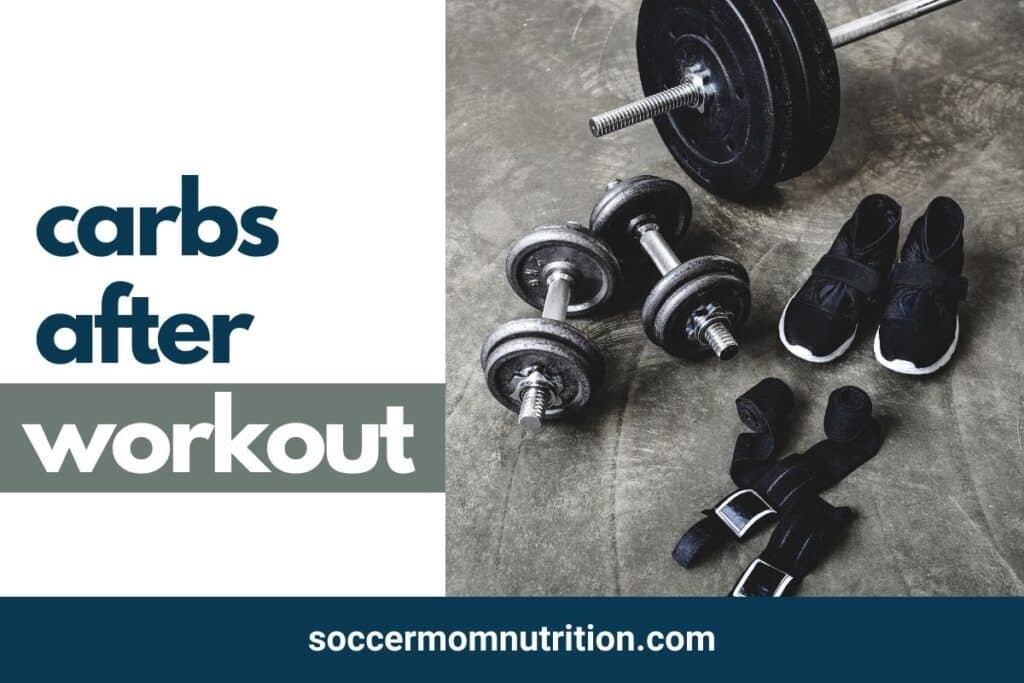Carbs After Workout: Why They Matter and How Much You Need
If you are an athlete, you know that nutrition is important for your performance and health.
One of the most important post game, exercise or training routines is to make sure you get carbs after workout so that you can recover and be ready for your next activity.
In this blog post, we will explain why carbs after your workout are essential for your recovery and muscle growth, how much you need and what are the best sources.
We will also give you some examples of post-workout carbs that you can enjoy after your training session.

Please note that this article contains affiliate links. If you click one of these links and make a purchase, we may earn a commission. As an Amazon Associate, we earn from qualifying purchases.
What are carbs and why do you need them
Carbohydrates are one of the three main macronutrients that your body needs, along with protein and fat.
Some carbohydrates are simple, such as glucose and fructose, which are found in fruits and honey.
Other carbohydrates are complex, such as starch and fiber, which are found in grains, beans, and vegetables.
Carbohydrates have many functions in your body, but the main one is to provide energy for your muscles and brain. When you eat carbs, your body breaks them down into glucose, which is the main fuel for your cells.
Glucose can be used right away or stored in your muscles and liver as glycogen. Glycogen is like a backup battery that you can use when you need more energy.
When you exercise, especially at high intensity or for a long time, you use up a lot of glucose and glycogen. This helps you perform better.
However, if you don’t eat enough carbohydrates after your workout, your glycogen stores may not be fully replenished. This can make you feel tired and weak, and affect your next game, training or workout.
That’s why eating carbs after workout is important. By eating carbohydrates within the first few hours after your workout, you can refill your glycogen stores and help your muscles recover faster.
This can improve your performance and health in the long run.
How carbs help your muscles grow
Another reason why carbs after workout are important is because they help your muscles. When you exercise, you create small tears in your muscle fibers. This is normal and necessary for muscle growth.
However, to repair these tears and make your muscles stronger and bigger, you need to provide them with enough nutrients.
One of the most important nutrients for muscle growth is protein. Protein is made of amino acids, which are the building blocks of muscle tissue.
When you eat protein after exercise, you provide your muscles with amino acids that they can use to repair and grow.
Since protein alone may not be enough to maximize muscle growth, carbs can help muscle growth by increasing insulin levels and blood glucose levels.
Some studies have shown that eating carbohydrates with protein after exercise can increase muscle growth more than protein alone (1).
The reason for this may be because of different factors, such as the type and amount of carbohydrates and protein used, the timing of the meals, the intensity of the exercise, and the age and fitness level of the participants.
The bottom line is that eating carbohydrates with protein after exercise can help your muscles recover and grow better than protein alone.
However, you don’t need to eat too many carbohydrates or worry about the type of carbohydrates too much. The most important thing is to eat enough protein and calories to support your growth and performance.
How many carbs do you need after a workout
The amount of carbs after workout you need depends on several factors, such as the type, duration, and intensity of your exercise, your body weight, your goals, and your overall diet. (2)
However, some general guidelines are:
- Consume at least 0.5 g of carbs after workout per pound of body weight within 30 minutes after exercise. For example, if you weigh 150 lbs, you should aim for 75 g of carbohydrates after your workout.
- Continue to eat carbohydrates every two hours for up to six hours after exercise to maintain a high rate of glycogen synthesis.
- Aim for a ratio of 3-4 g of carbohydrates per 1 g of protein after exercise to optimize muscle protein synthesis and recovery . For example, if you consume 75 g of carbohydrates, you should also consume 19-25 g of protein.
- Choose high-quality carbohydrates that are low in fat and fiber, such as fruits, rice, potatoes, bread, pasta or sports drinks. These post-workout carbs are easy to digest and absorb, and can quickly replenish your glycogen stores .
Examples of post workout carbs
Here are some examples of post-workout carbs that you can eat or drink after your workouts:
- Banana (27 g of carbs) with a glass of milk (12 g of carbs and 8 g of protein)
- Cooked oatmeal (1 cup, 27 g of carbs) with a scoop of whey protein (20 g of protein)
- Slice of whole wheat bread (15 g of carbs) with peanut butter (7 g of protein) and jelly (10 g of carbs)
- Cooked brown rice (1 cup, 45 g of carbs) with chicken breast (25 g of protein) and broccoli
- Sports drink (15 g of carbs per 8 oz) with a protein bar (20 g of protein and 25 g of carbs)
- Chocolate milk (26 g of carbs and 8 g of protein) with a rice krispy treat (17 g of carbs)
- An 8 oz glass of tart cherry juice (28 g of carbs) with some cheese (7 g of protein)
- Smoothie made with yogurt (12 g of carbs and 8 g of protein), berries (15 g of carbs), honey (17 g of carbs), and pea protein powder (20 g of protein)
Summary
Carbohydrates are essential for your recovery after exercise. They help you restore your muscle glycogen, stimulate muscle protein synthesis, and prevent muscle breakdown.
To get the most out of your carbs after workout, consume at least 0.5 g pound of body weight within 30 minutes after exercise, and continue to consume carbohydrates every two hours for up to six hours.
Also, aim for a ratio of 3-4 g of carbohydrates per 1 g of protein from high-quality sources. By following these guidelines, you can improve your performance and recovery after exercise.
Try some of these post-workout carb tips and see how they help your recovery!
Stephanie Magill, MS, RD, CD, FAND has over 22 years of experience in public health and nutrition. As a performance registered dietitian nutritionist, Stephanie specializes in sports nutrition and provides simple and actionable information so that athletes can be well fueled for high performance on and off the field. Stephanie has a Master’s Degree in Nutrition and is a Fellow of the Academy of Nutrition and Dietetics.

